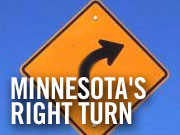|
Audio
Photos
Your Voice
|
The power shifts to the suburbs
August 10, 2003
 |
| Blaine resident Dave Miskowiec worries about growing class sizes (MPR Photo/Laura McCallum) |
 | |||
Blaine, Minn. — The suburbs, where about 40 percent of Minnesotans live, are not a homogeneous voting bloc. Minnetonka has been solidly Republican for years, while South St. Paul sends Democrats to the Legislature. Others are less predictable. One district in New Brighton swung back and forth every two years during the 1990s.
And in Blaine, the northern metro city of 50,000 is represented by one Democrat and one Republican in the Minnesota House. The mix of political leanings was evident in the numerous block parties held last week for National Night Out. At one of Blaine's five mobile home parks, more than 100 residents enjoyed a pig roast.
One of the residents, retiree Donna Hulke, said her biggest concern right now is safe neighborhoods. "The crime is what scares me," Hulke said. "Because I have grandchildren, a 19-year-old and a 16-year-old. That scares the heck out of me, with drugs and everything and the guns. Don't get me on the gun situation!"
 | |||
Hulke said she's upset about the concealed carry handgun legislation that passed this year. She's also not happy about the no-tax-increase budget solution approved by the Legislature, and said lawmakers shouldn't have cut human services and aid to local governments.
Support for the Republicans
At another block party across town, in a relatively new housing development, residents were much more supportive of the budget fix. Dave Miskowiec, a Culligan salesman, said he believes in leaner government, although he said he might feel differently if he had a government job.
"I don't really see the people that could probably use the help that have 'slipped through the cracks'", said Miskowiec. "I haven't seen that too much. I think those people are kinda like - they don't live here, anyway."
Miskowiec has three young children, and said education is a big issue for him. He worries about growing class sizes.
|
When you look at some of those people, they do not represent the voters in their districts when it comes to their ideology.
- Mike Erlandson, DFL Party chairman |
Blaine Mayor Tom Ryan has heard the concerns of residents like Miskowiec and residents like Hulke. Ryan has lived in Blaine for 34 years, and said the city used to be a DFL stronghold.
"The attitude was if you owned a garage, you had to be a Republican, and we didn't want you here," Ryan said. "Which is total false in this city. There's a lot of Democrats and Republicans, both, that are wealthy in this city that are doing well, they're all doing well."
Ryan doesn't consider himself Republican or Democrat. He said Blaine and its neighboring suburbs have definitely become more conservative in recent years. But he said residents who don't want their taxes raised might also find they don't like cuts in city services. Blaine lost all of its local government aid in the budget passed by the Legislature.
Ryan said the city has cut four community service officers, and won't be able to expand the police force to deal with crime problems in a rapidly-growing community.
Suburbs are at the heart of the action
Suburbs like Blaine will be a battleground in the 2004 election, when Democrats hope to regain some of the House seats they lost in 2002.
DFL State Party Chair Mike Erlandson said he thinks at least 10 of the suburban seats favor Democrats, yet sent Republicans to the Capitol in the last election.
"When you look at some of those people, they do not represent the voters in their districts when it comes to their ideology," said Erlandson. "We have some of the most right-wing members coming out of the suburbs."
 | |||
Erlandson said he thinks DFL candidates will do well if they talk about education, transportation and public safety. But Republicans say they're talking about the issues that resonate in the suburbs.
Gov. Tim Pawlenty, who represented Eagan in the Legislature for a decade, said suburban voters want safe communities, lower taxes, good schools and limited social services.
"If you focus on what most people care about and what impacts their lives most directly," said Pawlenty. "I think the Republicans have offered a pretty good package of issues over the last few election cycles, and it makes a difference."
Why the suburbs are the 'swing' vote
Analysts say suburban voters are difficult to predict, because they're not as loyal to particular parties or candidates. Former DFL legislator Myron Orfield, who has researched suburban growth across the country, said inner-ring suburbs tend to lean Democratic, while more affluent suburbs vote Republican.
"It really depends on a combination of things," Orfield said. "The broad political trends of the country, the effectiveness of the party message, you know, the strength of the local candidate; there's a lot of things."
Orfield said while Republicans dominate the suburbs in Minnesota, nationally, the suburbs have been shifting back and forth between parties for the last 25 years.
|
News Headlines
|
Related Subjects
|

